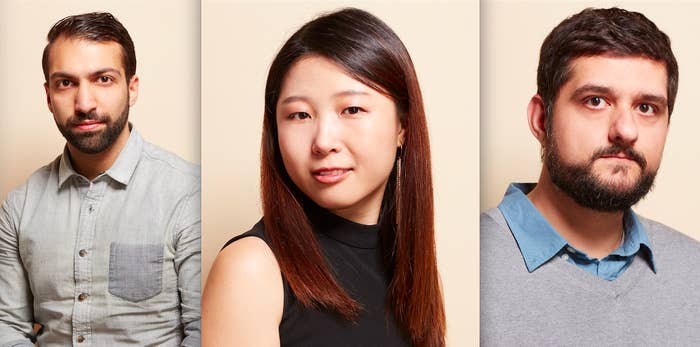
Banned, a new online photo project that debuts today, looks at the impact of President Donald Trump’s immigration order through the lens of tech workers whose lives have been affected by the ban. The collection features portraits and in-depth interviews with six individuals, like Shahrouz, an Iranian-American product designer for Pinterest, who lives in fear of being separated from his wife and son, and Ruthia, a product designer for Facebook here on a work visa from Beijing, who is worried that Trump’s policy could increase anti-immigrant sentiment among the people around her.
In the interviews, subjects describe a sudden sense of panic following Trump’s order, which is still being debated in court. “I have [US] citizenship, so I think that grants me certain rights, but overnight, people with green cards are no longer able to be in the country,” said Gabriel, a virtual reality product designer at Facebook who was born in Cuba. He said he has family members who are trying to enter the US but are stuck in limbo. “Who knows? All these things that we take for granted that we think are like a foundation of security, all those things might be stripped away overnight.”
On Jan. 27, Trump signed an executive order banning refugees and immigrants from seven Muslim-majority nations from entering the US. A few days later, after the ban inspired large protests in the US and caused chaos and confusion at airports around the world, a federal judge issued a nationwide order halting enforcement of both visa and refugee provisions of Trump's order. Since then, a federal appeals court has denied the government’s request to allow it to enforce the order as the case challenging it makes its way through the courts. Late last week, Trump announced plans to soon issue a new executive order to replace his first travel and refugee ban.
Omid, an Iranian citizen here on a green card who used to work for Google and is currently getting his MBA at Stanford, said he felt “humiliated” after living in the US for seven years. “Suddenly I felt degraded as a second-class person in this country.”
Helena Price, the photographer and oral historian behind the project, told BuzzFeed News that the goal of Banned is to fight stereotypes around immigration, which exist even in Silicon Valley, where tech companies have made a big show of disavowing Trump’s executive order. People who have been hurt by the administration’s policies “might be working next to you at Google or Facebook, but they are secretly dealing with existential crises than most of us can’t even comprehend,” said Price.
Banned is a “special edition” of Techies, Price's larger-scale photo project that attracted a lot of media attention when it was released last April. Techies also blended art and activism, featuring portraiture and interviews that focused on groups that typically get excluded from the Silicon Valley narrative, such as women and people of color. Price said tech companies have used the repository of 100 profiles to recruit speakers and employees. One Google employee even got promoted after the company read her entry, she said.
But Price was dubious about whether Banned could make an impact beyond artistic impression. “I don’t know, to be honest,” she said. “I think at the lowest level it’s really just me sticking to my philosophy that we should always use our skills in a way that elevates those who don’t have the same advantages.”
Compared to other immigrants singled out by Trump’s executive order, tech workers seem to have the support of their employers and more resources at their disposal. Still, said Price, “All of the Silicon Valley privilege in the world can’t help them because of where they’re from. It’s kind of this big equalizer, when you think about it, if suddenly your papers don’t count.”
The lengthy interviews, presented both as text and audio, touch on similar facets of the immigrant experience — the bureaucratic vetting process, the anxiety of hoping to win the visa lottery. Many of the subjects also described the sense of belonging they felt living in the Bay Area before Trump’s immigration order was issued.
“The funny thing is I never ... Until two weeks ago, I never even thought of myself as an immigrant,” Omid told Price. “I know I was not an American because I didn't have the citizenship, but I always saw myself as a fully contributing and highly integrated member of the society, paid my taxes, embraced American values, lived the American dream in many ways, and suddenly you get this stamp on you which says you're an immigrant. Not only that, you're also from one of those seven countries we just suddenly decided not to like.”
Shahrouz, the designer from Pinterest, spoke candidly about his reaction to the new administration: "Immediately after Trump was elected, my first thought was, 'Thank goodness my son looks white,' which is a terrible thought to have. There's something psychologically profound about being labeled an enemy even though I have nothing but love for this country and its potential. In the eyes of so many people who don't know me, who don't know my family, just having a bias against us that we would want to hurt them in some way, is troubling at best."
